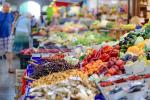Horizon Europa Spoon Project: Food Systems in Transition – Participatory, open citizen research for sustainable nutrition
- Type Project
- Status Signed
- Execution 2024 -2028
- Assigned Budget 5.022.917,5 €
- Scope Europeo
- Main source of financing Horizon Europe 2021-2027
- Project website Proyecto SPOON
Food systems contribute up to 37% of global greenhouse gas emissions and could increase to 50–90%. Conflicts, climate crises, and inequality weaken supply chains, causing food insecurity even in prosperous regions. In Europe, 38 million people lack access to sufficient and healthy food. Addressing these problems requires innovative technologies, behavioral changes, and policies that consider cultural dietary practices.
Traditional top-down approaches are insufficient in today's rapidly changing landscape. The EU-funded SPOON project shifts the focus to the realities of local consumers and operational environments through citizen science, empowering communities to generate knowledge and foster collaboration. By integrating citizen science, consumer behavior, and data sharing, SPOON seeks to drive data-driven decisions for healthier and more sustainable diets and reduce food insecurity.
The global food system, responsible for up to 37% of GHG emissions, requires urgent transformation due to the challenges posed by urbanization and unsustainable diets. Furthermore, climate change and biodiversity loss exacerbate the vulnerability of European food systems, as seen in recent climate-related disasters such as wildfires and droughts, compounded by shocks such as the COVID-19 pandemic. Despite Europe's abundant food supply, food insecurity threatens millions of European citizens, requiring a comprehensive approach encompassing knowledge, technologies, behaviors, and policies that promote healthier and more sustainable food systems.
Considering citizen science (CS) as a powerful tool to achieve these goals, SPOON takes an innovative approach to food insecurity by using CS to empower citizens to create a more inclusive and sustainable food environment. SPOON's four main objectives are: to deepen scientific knowledge about food environments; to increase policymakers' capacity for data-driven decision-making; to foster cross-sector collaboration; to increase citizens' agency in changing their food consumption behavior and local food environments; and to foster greater citizen trust in sharing personal food data. SPOON bridges the gap between intention and action toward healthier and more sustainable diets by placing citizens at the forefront of food system transformation through the integration of civil society.
SPOON's conceptual framework centers on six CS Labs across Europe, coordinated by local partners and utilizing a multi-stakeholder approach. Citizens participate as researchers and subjects, testing and validating innovative digital tools to collect, analyze, and interpret data on their food consumption behaviors and local food environments, and then co-design and implement small-scale behavior change interventions with other stakeholders. SPOON prioritizes compliance with the GDPR and the FAIR principles in its data management.
- Report on the Governance of Urban Food Policies: An analysis of the cases of Córdoba and Valladolid shows that, although multi-stakeholder governance mechanisms have been implemented, their effectiveness is still limited. This analysis highlights that, while participatory policies are necessary, they are not sufficient. They require the support of resources and public policies that promote the creation of robust social networks to support long-term transformation processes. To achieve structural change, it is essential to integrate food with broader urban policies, such as climate, housing, transportation, and health.
- Food Environment Report: A socio-spatial study in Madrid and Barcelona reveals that, despite the availability of fresh food, the most vulnerable populations remain exposed to low-quality options. The report highlights the difficulties in accessing organic food, especially in areas with lower purchasing power. The report highlights how these cities have become "obesogenic" environments, where access to unhealthy foods is easier and cheaper, especially for vulnerable populations and in areas with high tourist pressure. "Food deserts" and "food swamps" were identified in Madrid and Barcelona, areas where access to fresh and organic foods is limited, and proposes changing these environments to facilitate healthy and sustainable diets.
- Report on the Relocalization of Agri-Food Systems: Research in Madrid and Valencia highlights the need to diversify local production and plan agri-food infrastructure (industry, logistics, etc.) to close local economic cycles, as current self-sufficiency does not exceed 5%. Therefore, the diversification of agri-food production is advocated to adapt to local ecological capacity. It is recommended to promote sustainable diets to reduce the ecological footprint, especially given the high consumption of animal products.







